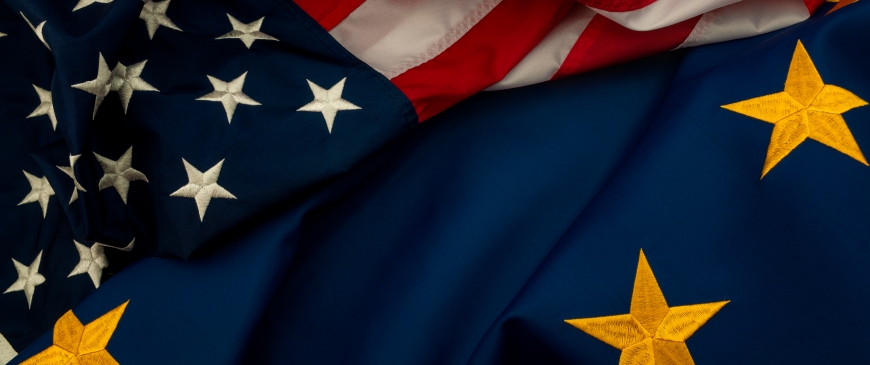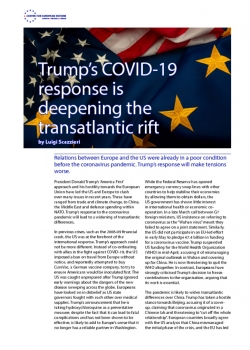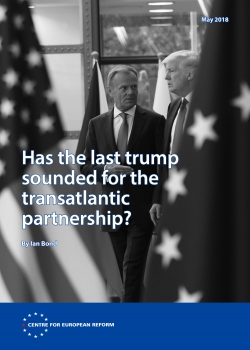
Trump's COVID-19 response is deepening the transatlantic rift
Relations between Europe and the US were already in a poor condition before the coronavirus pandemic. Trump’s response will make tensions worse.
President Donald Trump’s ‘America First’ approach and his hostility towards the European Union have led the US and Europe to clash over many issues in recent years. These have ranged from trade and climate change, to China, the Middle East and defence spending within NATO. Trump’s response to the coronavirus pandemic will lead to a widening of transatlantic differences.
In previous crises, such as the 2008-09 financial crash, the US was at the forefront of the international response. Trump’s approach could not be more different. Instead of co-ordinating with allies in the fight against COVID-19, the US imposed a ban on travel from Europe without notice, and reportedly attempted to buy CureVac, a German vaccine company, to try to ensure Americans would be inoculated first. The US was caught unprepared after Trump ignored early warnings about the dangers of the new disease sweeping across the globe. Europeans have looked on in disbelief as US state governors fought with each other over medical supplies. Trump’s announcement that he is taking hydroxychloroquine as a preventative measure, despite the fact that it can lead to fatal complications and has not been shown to be effective, is likely to add to Europe’s sense that it no longer has a reliable partner in Washington.
The US government has shown little interest in international health or economic co-operation.
While the Federal Reserve has opened emergency currency swap lines with other countries to help stabilise their economies by allowing them to obtain dollars, the US government has shown little interest in international health or economic co-operation. In a late March call between G7 foreign ministers, US insistence on referring to coronavirus as the “Wuhan virus” meant they failed to agree on a joint statement. Similarly, the US did not participate in an EU-led effort in early May to pledge €7.4 billion in funding for a coronavirus vaccine. Trump suspended US funding for the World Health Organization (WHO) in mid-April, accusing it of mismanaging the original outbreak in Wuhan and covering up for China. He is now threatening to quit the WHO altogether. In contrast, Europeans have strongly criticised Trump’s decision to freeze contributions to the organisation, arguing that its work is essential.
The pandemic is likely to widen transatlantic differences over China. Trump has taken a hostile stance towards Beijing, accusing it of a cover-up, claiming that coronavirus originated in a Chinese lab and threatening to “cut off the whole relationship”. European countries broadly agree with the US analysis that China mismanaged the initial phase of the crisis, and the EU has led calls to launch an international investigation into the handling of the pandemic. Europeans also agree on the need to build more resilient supply chains that depend less on China. Even before the pandemic they had moved to protect strategic economic assets by scrutinising Chinese investments in Europe more closely. Now they are concerned that China will take advantage of Europe’s economic woes to buy up European firms at bargain-basement prices. But Europe will be reluctant to back a much harder US stance towards Beijing. Europeans are aware that Europe cannot completely cut itself off from China, and they can still benefit from trade and health co-operation with Beijing. Moreover, the lack of US and EU leadership has allowed Beijing to present itself in a positive light in many member-states such as Italy, providing them with medical equipment (even if some of it has been faulty). Most Europeans do not see China as a serious threat: for example a recent poll by Pew Research Center and Körber-Stiftung found that Germans were just as keen on having close relations with China as they were with the US.
Both the US and Europe are likely to become more protectionist as a result of the pandemic. Moves to reshore essential industrial supply chains, combined with greater use of subsidies, would lead to increased trade tensions. The economic fallout of the pandemic will also fuel the transatlantic spat over defence spending within NATO. The recession caused by lockdowns will probably lead to cuts in European defence budgets. Making the case for military spending will be difficult when countries are faced with competing demands to pump billions into healthcare and the economy to save businesses and jobs. And, as in the aftermath of the 2009 financial crisis, the impact of defence spending cuts will be deeper if European countries fail to co-ordinate. New EU initiatives such as the European Defence Fund, which could lessen the impact of cuts by promoting greater co-operation, were already being scaled back before the pandemic, and are at risk of being further reduced. This would remove a bone of contention with the US, which dislikes the initiatives, but worsen the impact of spending cuts.
The economic fallout of the pandemic will also fuel the transatlantic spat over defence spending within NATO.
If Trump loses the election to Democratic candidate Joe Biden later this year, there would still be differences between the EU and the US on trade, China, and defence spending – but tensions would ease. Europe and the US would be much more likely to come to an understanding on trade, and disagreements over NATO burden sharing would also soften. The chances of a joint, and therefore more effective, approach towards China would also improve, although Democrats are taking a harder line towards Beijing than Europe is, pressing for allies to exclude Chinese firm Huawei from building next generation 5G mobile networks. Above all, however, a Democrat administration would not be hostile to the EU itself, and would recommit the US to upholding multilateralism: Biden has already stated he would re-join the Paris climate agreement and seek to revive the nuclear deal with Iran. Together, the EU and the US could launch a programme of economic and medical assistance to help developing countries counter the pandemic, collaborate to address the climate emergency and work together in the Middle East.
A second Trump presidency, however, would be a defining event for the transatlantic relationship and for the multilateral world order. Trump would have few reasons to be restrained in pursuing his nationalist approach in what would be his final term. Under one scenario, the US and Europe would increasingly diverge, with European leaders concluding that the US could no longer be seen as a partner, and trying to build a more assertive and autonomous Europe, including by investing much more in its own defence capabilities.
Another scenario is equally possible, however, if Europe does not behave as one coherent entity. EU member-states might be unwilling to agree to deeper co-operation, torn apart by increasingly bitter disagreements over issues ranging from financing the economic recovery, to the rule of law, migration and climate change. In that case, some states might turn towards Beijing in search of economic opportunities, while others could latch onto the US for protection, fearing Russian aggression or instability in the Middle East. In either case, a second Trump term risks permanently damaging the transatlantic relationship, and weakening the West as a whole.
Luigi Scazzieri is a research fellow at the Centre for European Reform.



